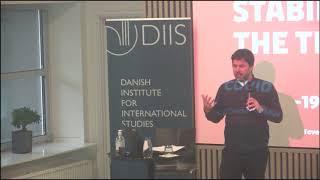Livestreaming
Ghanaian stability put to the test

Wednesday 7 October 2020, 14.00-16.00
DIIS ∙ Danish Institute for International Studies
Auditorium
Ghana is known as one of the most stable countries in a region, West Africa, that has experienced considerable instability since the end of the Cold War. The 1990s were characterized by the wars in Sierra Leone and Liberia, while the 2000s are defined increasingly by a collapsing Sahel and contentious electoral processes in La Cote d’Ivoire, Benin, and Togo. A strong administrative and ideological legacy from Nkrumah, Ghana’s first president after independence, and a proactive foreign policy in the region, especially since the early 1990s, have both had a stabilizing effect on Ghana.
However, Ghana’s stability is not a given, and with the upcoming general elections in December 2020, many of the country’s challenges are accentuated.
As with many of its neighbors, like Togo and La Cote d’Ivoire, the same elites have been in power for decades, oscillating between the National Patriotic Party, which is currently in power, and the National Democratic Congress, the main opposition party. Frustrations with state institutions that are heavily politicized give a sense of missed opportunities, and the development of monetized and violent forms of governance. In practice, this translates into increasingly deep-seated corruption. In the security sector this has translated into a weakened police service, the emergence and impunity of political vigilante groups, established by the political parties and individual politicians, and the increasing use of the military for internal security. To these long-term dynamics, a question is emerging about the shock effects of COVID-19, and the partial shutdown of the global economy, which we still do not know the short to medium-term consequences of.
What is in store for Ghana in the coming year(s)? What is the likely outcome of the elections? And how has the government dealt with COVID-19?
Kwesi Aning, research director at the Kofi Annan International Peacekeeping Training Centre, and Tove Degnbol, who recently left her position as Danish ambassador to Ghana, will discuss these questions.
Speakers
Kwesi Aning, Research Director, Kofi Annan International Peacekeeping Training Centre
Tove Degnbol, Former Danish Ambassador to Ghana
Peter Albrecht, Senior Researcher, DIIS
Programme
14.00-14.10 Introduction, Peter Albrecht
14.10-14.30 Politics, Security, and the December Elections, Kwesi Aning
14.30-14.50 COVID-19 and its Consequences, Tove Degnbol
14.50-15.30 Q&A
15.30-16.00 Reception
Practical information
The seminar will be in English and livestreamed here on this event page. Livestream does not require registration.
Due to the COVID-19 there will only be 50 seats available in the Auditorium. Participation is free of charge, but registration is required for a seat. Please use our online registration form no later than Wednesday 7 October at 10.00.
Sign up
DIIS Experts


